On The Record with Olympian Betsey Armstrong—New Member of USA Water Polo Hall of Fame
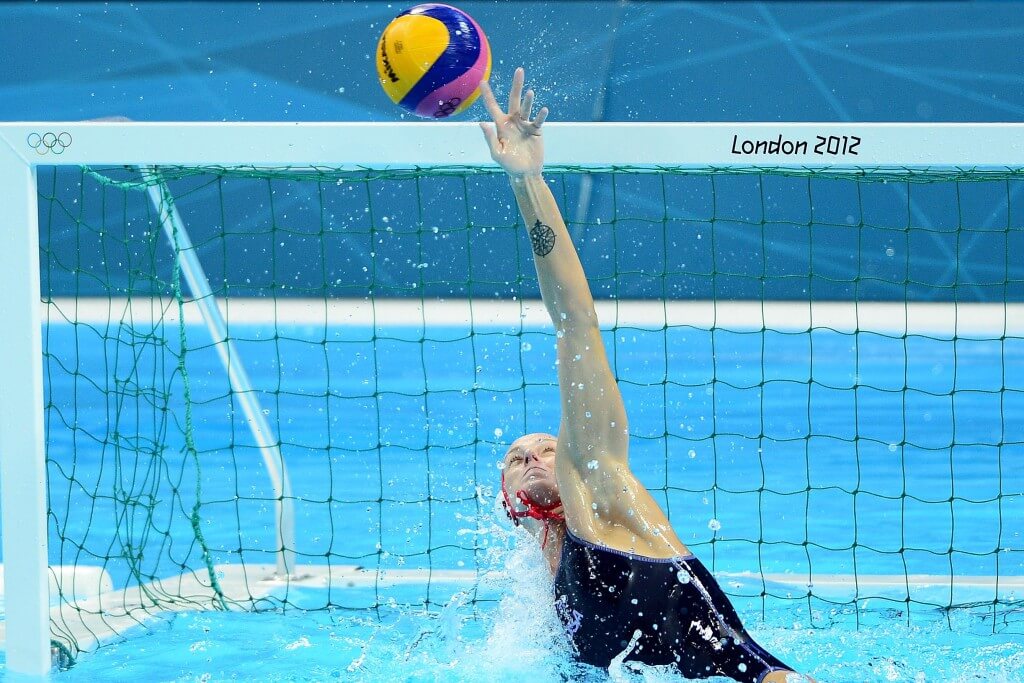
Having just qualified for the 2020 Tokyo Olympics, where they will be an overwhelming favorite to win a third-straight gold medal, it’s instructive to look back, to when the U.S. women’s water polo team wasn’t a juggernaut winning titles in 11 straight tournaments. Just ask Betsey Armstrong, who in 2012 backstopped the Americans to their first gold, about the challenging path she and her teammates took to success.
[Water Polo Odyssey Takes Greek Women To California and Collision with Team USA]
Starting with her University of Michigan career (2002-05), where she was a four-time All-America and helped propel the Wolverines into the NCAA tournament for the first time in program history, Armstrong was a key player in the U.S. women’s transition from contenders to champions. During her Michigan career, the Ann Arbor native—who starred locally at Huron High School—complied a number of all-time program records, including saves (1,267), save percentage (.654) and wins (85).
A rare non-Californian on a national team roster dominated by West Coast players, Armstrong established herself as the world’s top goalie. She was in cage when Team USA enduring a crushing loss to Holland in the 2008 Olympic final in Beijing. Redemption was four years in the making; at the London Games she made a crucial penalty stop late in the final. The Americans defeated Spain, finally earning a much-deserved gold.
For her efforts, last month Armstrong was inducted into the USA Water Polo Hall of Fame, adding to a growing list of accolades. In 2018 she became the first water polo player to be chosen for the University of Michigan Hall of Honor; she previously had been honored as a member of the Collegiate Water Polo Association (CWPA) Hall of Fame (2008).
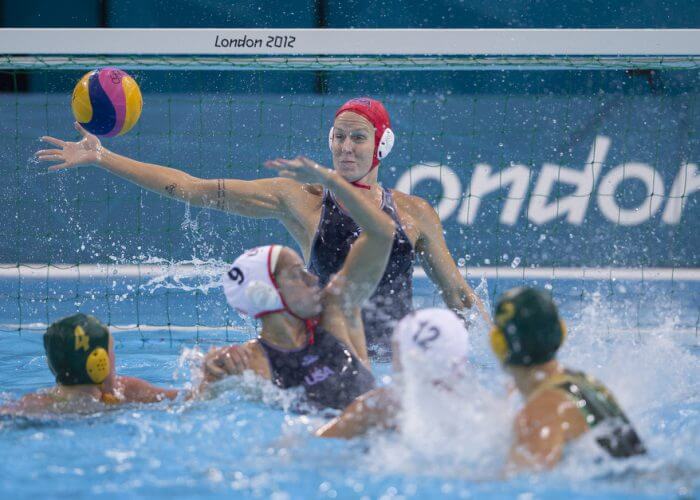
Armstrong standing tall in the 2012 Olympics. Photo Courtesy: Jeff Cable
Now looking at polo from the perspective of a coach and a mother—she’s married to Marist women’s head coach Chris Vidale and they have two children—Armstrong spoke with Swimming World about her rise to elite status at Michigan, the disappointment of 2008, the elation of 2012 and how her future in the sport has been defined by her success as a member of Team USA.
– You started playing polo at the same time as Alison Gregorka—a teammate on the 2008 Team USA roster—who is also from Ann Arbor.
I was born and raised [in Ann Arbor] and my whole family has attended the University [of Michigan]. I began playing the sport after my older sister had been playing for a few years. She’s four years older than me and at that time polo was a club sport.
I would go on these trips to Canada or Chicago to play with high school or college-aged women in tournaments just to get experience and see the sport. That was something that really contributed to my development—having that openness for younger levels to play up and get exposed to the sport. That was how Allison got involved. We went to different schools but it’s such a small area that you all influence each other.
– In 2001 the National Junior Olympics were held in Michigan.
It’s too bad that we can’t have JOs spread out a little more now. I remember it was 2001 and it was the summer between my senior year and freshman year of college because I had already committed to Michigan. I remember finding my teammates who were coming from various clubs in California and throughout the states and we were linking up at that point. It was really cool because it was special for me to showcase my hometown.
The facilities in Ann Arbor—the Canham Natatorium—are phenomenal. I can’t speak from experience, but to be from California and play the sport, you know somewhere else is really valuable. The East Coast, the Midwest, the Southeast are always going out to California for high levels of play.
The more we can open that up a little bit, the better.
– You could have spurned family tradition and gone to UCLA.
I visited, Adam [Krikorian]—my coach in the 2012 team—he recruited me at UCLA. And I was very close to going to UC Berkeley; for me the school and the culture was so similar [to Michigan]. However, I was a homebody and my whole family went to Michigan. There was that natural inclination to stay close to home, but when I was being recruited by Michigan their assistant coach at that time was Bernice Orwig, who she was the goalkeeper from the women’s team and a silver medalist from the Sydney Games.
That was a huge opportunity for me to have this personal coach who had been through the Olympic system and she played at USC—she won a national championship. When I was going into Michigan, it turned out that she was only there for one year, but I still got a whole year with her. I credit so much of my development from, sort of the foundation of my development moving forward.
– When did Matt Anderson arrive to coach at Michigan?
My freshman year Bernice was our assistant and Amber Drury was the head coach. After that year they both left and Matt [Anderson] was my coach sophomore, junior, and senior year.
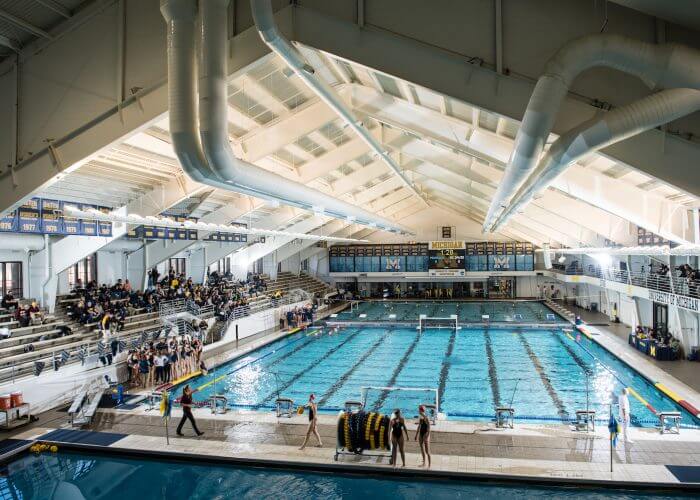
Canham Natatorium at the University of Michigan. Photo Courtesy: Eric Bronson
– How was it to play in the NCAA tournament?
It is tough—[polo is] a team sport. It’s hard to focus on everything you need to focus on in a college season. Especially now; I can say this in hindsight having gone on to very long international career after. It’s hard to imagine how these—and I’ve seen it with my husband’s college team—it’s really difficult to see how these guys can get anything done. 20 hours a week is no shortage of time but you’re dealing with kids who are going to school full time at academically rigorous programs. It’s incredibly challenging to create that ability to focus and get everything you need get done in the college system.
– When did you think: I can play for the national team?
A big moment for me was my junior year before the 2004 Olympic games. The national team at that time was coached by Guy Baker and his staff and they did collegiate tours where the national team would go on tour and play different universities throughout the country. They came to Michigan and my team played what was going to be the Olympic team in 2004 that went to Greece. None of that stuff and none of those players were new to me. Growing up I’d played off and on for the youth team and the junior team.
Just to see a first-hand glance at the senior national team when they were preparing to go Athens was inspiring to me. There was this big team dinner afterwards where the Michigan team got to eat dinner with the soon-to-be Olympic team; it was just a really special part of the sport. At that age, I got to see something that was more meaningful to me than if it had been 2 or 3 years prior.
– In 2008 The New York Times referred to you and your teammates as the “Just Missed Kids” after losing to Holland in the Beijing final.
It’s just crushing. You look at that 2008 team—and this is after the women’s team has already gotten to the Olympics [with] experience from Sydney, to Athens then to 2008—same staff, same systems, really similar rivalries and how they match up with everyone in the world. Of course, getting to Sydney wasn’t always what they thought was going to happen. By no means was it luck for them to be in that final game but they were trying to compete with Holland and Russia. For them to go on and be in the final in Sydney and fall short in those final seconds…it was magical for them to even be in that game.
Then you go on to 2004, where there’s this controversial call in a semifinal game, and the thought is there’s politics behind it—that the officials prevented them from being in that final. In 2008, our focus was: how are we going to take the officials out, how are we going to take [on] everyone else. We’re going to train harder than any team in the world. We’re going to make ourselves unbeatable. We’re going to play unstoppable five-on-six. No matter how many times an official wants to kick us out or screw us over or whatever you say—it’s gonna be impossible.
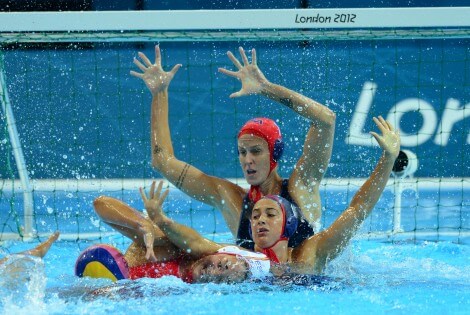
Maggie Steffens (dark cap), Armstrong in 2012. Photo Courtesy: Mark J. Rebilas-USA TODAY
We’re going to play five on six and the best counter-attack in the world, so it removes [any type] of the officials’ ability to interject how they think it ought to shake out in the end. If we can do those two things [perfectly] we can be the best team, we can win no matter what.
That was the mentality of that 2008 team. We felt that the gold medal was there for us. Then, to not win that in 2008 was really devastating. It took a while for me to wrap my head around it.
I had only been in that quad, that cycle for two full years. I joined the team in 2006. I don’t think that’s enough time to understand everything about international water polo and my role—and to get the experience and confidence in playing.
– How does Daniëlle de Bruijn manage to drop seven goals on the American defense?
You get surprised in the beginning and you make some adjustments but you can’t completely close the door. Having only been on this team for two years I don’t think I had the mental or emotional capacity to recover from such a start. We were down 4-0 [early] and to have that be the first quarter of a gold-medal game against a team three weeks prior we had been training with in Beijing.
We trained with Holland for a week in a training facility just outside of Beijing—we scrimmaged them and we were beating them like 20 – 3. Of course, we’re media trained to [say]: You can never underestimate your opponent—we always knew that was the right mentality to have. But it can’t help but influence you when you’re beating a team by 15 goals in scrimmages before the Olympic Games. We could help but think back on that: Oh, we can handle this team going into a final…. But being on that stage, with that emotion and the experience of the entire tournament, it’s very different.
– Guy Baker’s out, Adam Krikorian is in—you have to make a choice: new coach, new opportunity, new challenges.
A big priority for me was just giving myself the time to decide. I was lucky enough to go play in Europe for a year—I played in Italy for a team in the north called Firenze [in Florence].
As a student at Michigan I was an English major but I did a lot of history of art, including Italian, so that was very much a big interest of mine to spend time in Europe and enjoy the fruits of what I had just experienced [in the Olympics].
That gave me the opportunity to play without being under the pressure cooker [of Olympic competition] and enjoy living in a different country.
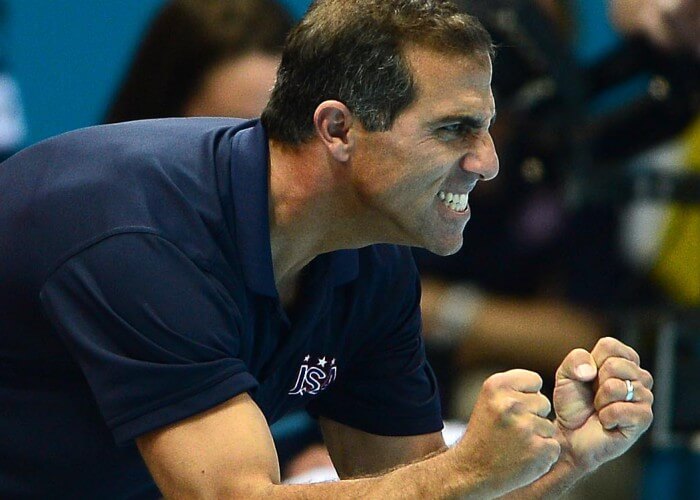
Adam Krikorian, U.S. head women’s coach. Photo Courtesy: Andrew Weber-USA TODAY
I knew Adam and I liked him. He recruited me for UCLA and I considered going there. I knew people that had played for him and loved him. Ultimately it was good for the team [but] the first year was very difficult. I was more challenged after our 2009 World Championship than I was after 2008. In 2008, I knew it wasn’t over; it was unfinished for me. However, after winning a world championship in 2009, that team went through a lot of pain within itself. Some of it had to do with the coaches—the entire 2008 team came back except for one person and everyone was dealing with the pain of 2008 in their own way. That made it a really difficult experience.
After that I had to ask myself: is this something I’m going to keep going with?
– Allison retired after 2009. Did you talk with her about her decision at that time?
We talked a little bit. We fell into two different categories. There was part of the team that really struggled with how the coaching staff was changing the perspective of how we needed to prepare. Ultimately, everyone had to make the decision in their lives that… we’re not going to be professional water polo players forever. It is a really specific or distinct kind of life that you live. As a team athlete, there isn’t that kind of independence that you might have like a swimmer, or a runner or a golfer. Something where you’re in charge of your own training and you have so much more personal responsibility. You have to accommodate your own ego and what you think is right to commit to this program—a vision that at that time was completely unknown to us. We didn’t know where we were going to go.
– In 2012 it’s not: What are the Americans going to do. It’s: maybe their window of opportunity has closed.
Exactly—especially when we had that turnover. We had some people come in to join our training group in 2009 and 2012 who had never played on a U.S. team or on the international circuit. So, there was a lot of new blood, and that created an atmosphere that [Krikorian] wanted. something that this group needed to overcome. In 2008, we won a world championship. In 2007, we won a world championship. We were the best team going into the Beijing Games. We won our bracket fairly fluidly. We went into that gold medal game—everyone thought we were going to win it. Holland hadn’t done particularly well leading up to that tournament.
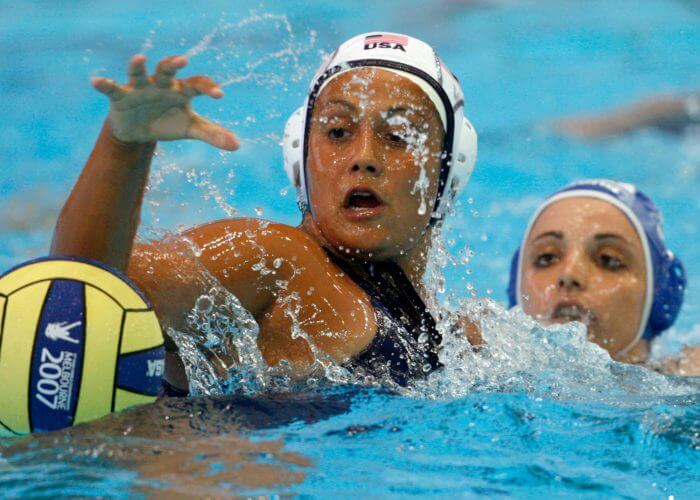
Brenda Villa in 2007. Photo Courtesy: Reuters Laszlo Balogh
I think Adam was looking for a new way that he could challenge this team. Before, we were always challenged by our coaches, and we united against them. It’s an old-school coaching technique. That next phase was: I’m really going to force this unit to challenge one another and figure it out. That [approach] brought the team much closer together than I ever thought they could be.
– What a great moment to finally succeed in London after so many expectations.
You look at someone like Brenda [Villa], she’s water polo player of the decade (2000 – 2010)! And then to go through that change between 2008 and 2012. That was not easy for any of us but we had Brenda, we had Heather Petrie, we went through that whole cycle together. It took a lot of vulnerability on their end to be challenged in a way that they had never been for that quad and to actually stick around.
– You achieve your goal—to win gold—you’re in the midst of another cycle of Olympic preparation, and in 2014 you decide to hang up your cap.
I wouldn’t say I mentally retired from the sport until 2016. I played in 2013 for the world championship team in Barcelona—we got fifth place. It wasn’t a fun trip because we didn’t do well. I coached for a bit after that, I played in France for a year, came back for the beginning of the 2014 season and was so burnt out, so exhausted—I had no choice but to go home. I had to take myself out of it.
A year later I went on a training trip, a friendly tournament in New Zealand. Adam called me up, they were bringing a younger goalkeeper and he said: Look, if she gets hurt I’m screwed.
I gave it some serious thought in 2015 about coming back and making a push for Rio. It was a very long time since I had been challenged—at that point I was 33—on the US side our team’s average age is 20 or something. It was big challenge for me to take on. Ultimately, I didn’t, but I wouldn’t say I felt closure from that until I had my child.
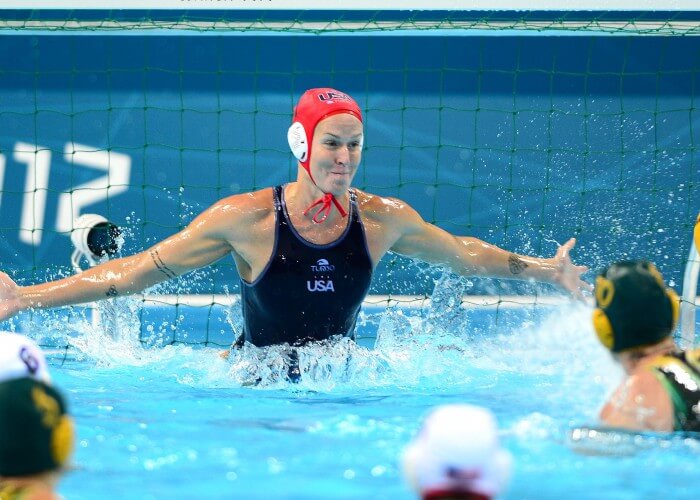
Photo Courtesy: Andrew Weber-US PRESSWIRE
On the men’s side, it’s totally different. This is not a water polo problem it’s a societal one. I felt all this pressure: need to start my family, I need to start my career, I need to do all this stuff if I’m going to be a functioning human being. There’s this sense, especially as a woman, that it’s hard to develop.
I love seeing Kerri Walsh, the volleyball player, and [other] athletes who are having their families and continuing to play. It breaks my heart that we haven’t crossed over into that [territory] yet for water polo. Again and again, as a team sport the dynamics are so different. Playing an Olympic sport where you’re not making millions of dollars and making a powerful career outside of the games, it’s very different.
You look at the Europeans and there’s a lot of women who play for the Russian team who take two years off, have kids, and play. That in and of itself is a whole different animal.
It will be exciting to see when that day comes.
– As you look back, what are the pluses—and minuses—that stand out from your career with the national team?
The further away from it I get, it’s so much about how I was taught to be successful with a group of people. We were always good, and everyone wanted to win—but it was all the little things that it took to make that happen. That’s where I think Adam has his finger on the pulse: how these young women need to be challenged. He did something that we hadn’t experienced before, creating a challenge within the group that we all had to overcome. And making sure that there was nothing that could break that group once we went into battle together.
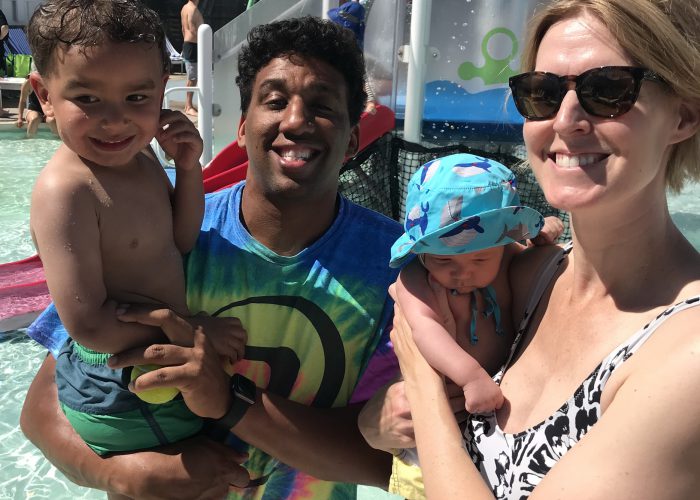
Clearly, water remains a priority. Photo Courtesy: B. Armstrong
That’s why he’s so successful. Yes, we have the best athletes in the world, we have amazing resources, we can train—on the international level there’s no limits on how much we can train—and with young players he’s able to push that.
Looking back on this now, it’s all about the relationships I’ve had and being willing to work with people that you don’t necessarily like all the time.
– How important was your family’s support in this athletic journey you’ve taken?
It’s hard to play a sport where there’s no attention on it except for an Olympic year. You make enough to live on—don’t get me wrong—we’re probably better off than some other sports. Emotional support was the biggest component for me, especially being so far away from my family. I didn’t move away from home until after I graduated from college; that was a big adjustment.
My family, and now my husband, have been the rock. And I’m now taking on this new challenge of coaching. It’s a wider range of experience. My biggest goal is to get more females on these pool decks.



